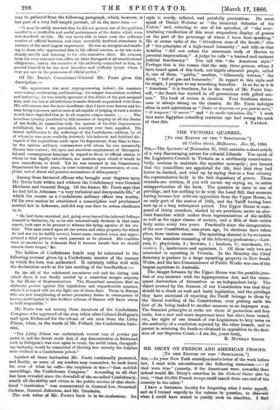MR. DICEY ON FRENCH AND AMERICAN TROOPS.
[TO THE EDITOR OF THE "SPECTATOR."]
SIR,—In your New York correspondent's letter of the week before last, I read with astonishment the following statement :—" If that were true" (namely, if the Americans were cowards) then indeed would Mr. Dicey's assertion in his Federal States also be true, " that 50,000 French troops could march from one end of the country to the other."
I have a fortunate faculty for forgetting what I write myself, and so I turned eagerly to the volume in question, to discover what I could have stated to justify snob an assertion. I find
on referring, that in discussing the military organization of the American volunteer armies, in a letter written at the time when M'Clellan was only just beginning to arrange the unwieldy masses of the Potomac army into something like order and dis- cipline, I used the following words:—
"The English officers who came down to Washington to in- spect the army were always very confident in their assertions that it would have no chance against a small force of well trained troops. I agree with them so far that I think it possible that a French army of 50,000 men might march from New York to New Orleans, and defeat any force it met on its path, but when that was done no vital result would be produced ; and with 50,000 men it would be impossible to occupy more than a single State."
At the time at which I wrote this letter home, no belief was more popular in England than the idea that if any great European power chose to interfere in America, it would find no difficulty in imposing its will upon the combatants. It was against this idea that I was arguing, as anybody might see who took the trouble to read the chapter in which the passage quoted occurs.
One of my many heresies is a belief that untrained volunteers are not a match for trained troops, till they have learnt their trade of soldiering by actual experience. I believed then, and I believe still, that in 1862 50,000 French troops would probably have de- feated any force that either North or South could have brought against them at one point ; and I believe now, as I stated then, that such an intervention would not have affected in any way the final result of the war. How far my statement as to the possi- bility of a trained army marching across the continent, has been borne out by the triumphant march of Sherman's veterans in 1865 is a matter of opinion.
I trust I have said enough to show that I did not indulge—as your correspondent represents—in a silly sneer against the learn- ing of our American newsmen. That I was not likely to have done so would, I should have thought, have been known to every one who ever read any of my writings, and to none more than your " Yankee" correspondent.—I am, Sir, your obedient servant,
EDWARD DICEY.































 Previous page
Previous page